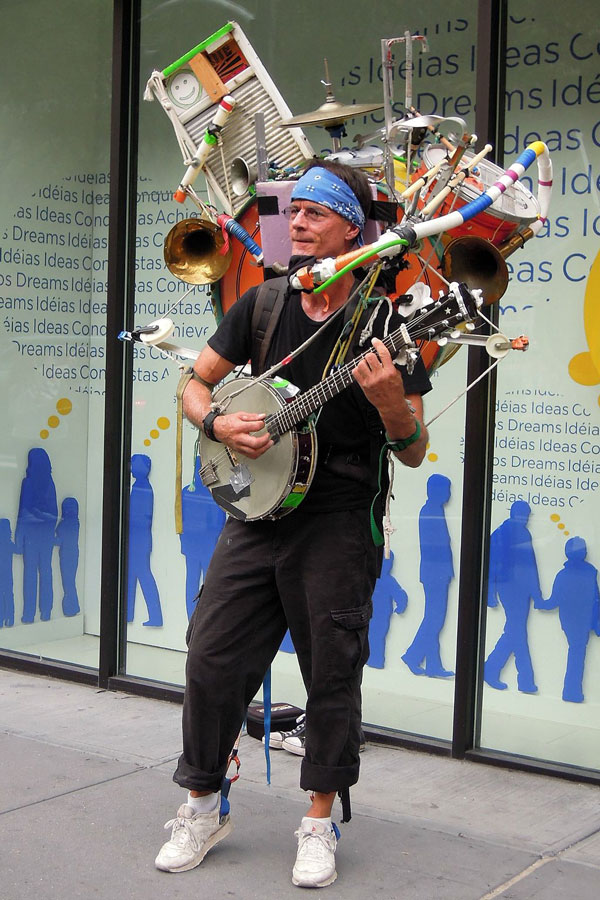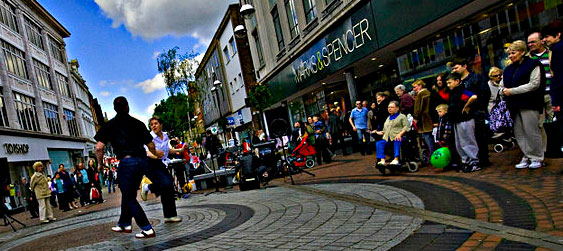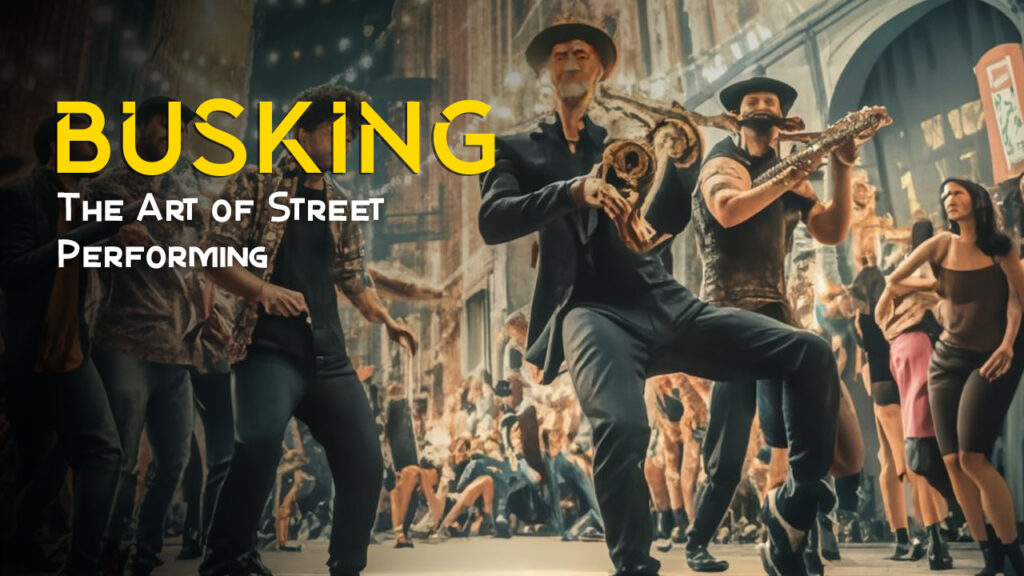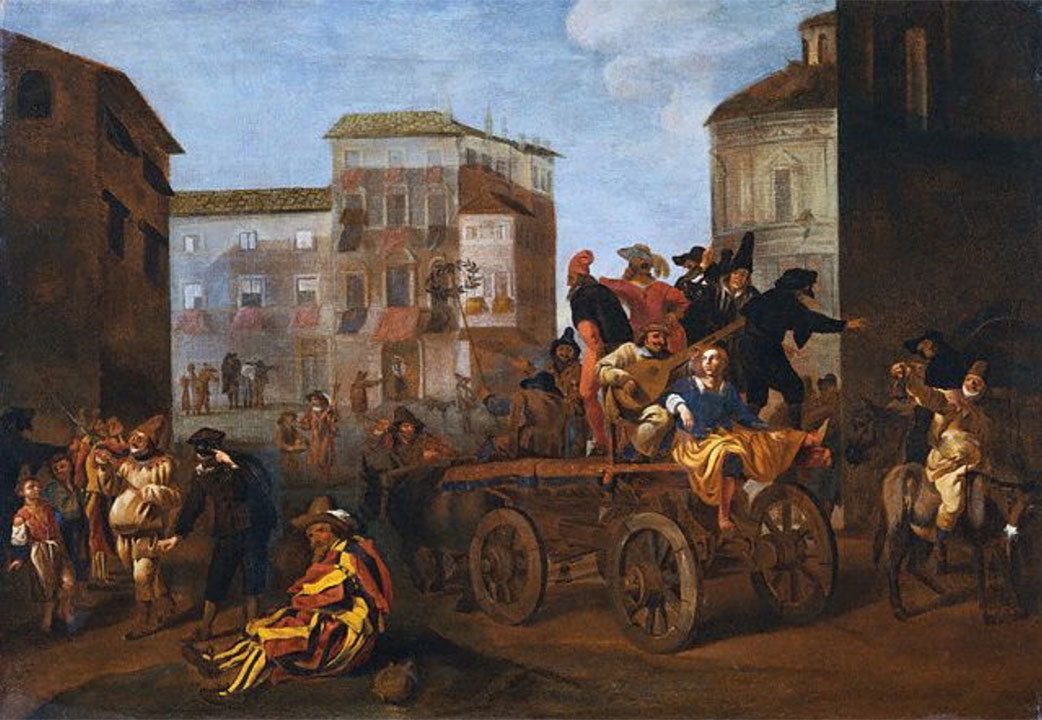What is Busking Definition?
Busking is the act of performing music, singing, dancing, or other entertainment in public spaces for tips and donations.
Buskers typically perform outdoors in high foot-traffic areas like streets, parks, festivals, subways, and sidewalks.
The term “busking” comes from the Spanish word “buscar,” meaning “to seek.”
A Brief History of Street Performance
Street performance dates back to ancient civilizations. Musicians, jesters, and all forms of entertainers would gather in city squares and marketplaces to earn coins from passersby.
During the Middle Ages, troubadours and minstrels traveled place to place, entertaining the community with songs and poetry in exchange for food, drink, and shelter.
Later, Italian Commedia dell’arte performers took to the streets in the 16th century, influencing theater and comedy for centuries to come.
In the 19th century, organ grinders with dancing monkeys or performing dogs became a common sight. Vaudeville variety shows eventually emerged from early street music and acts.
Types of Street Performers
Common forms of busking include:
- Musicians – solo singers/guitarists, bands, string quartets, percussion acts
- Dancers – hip hop, breakdancers, cultural dances
- Circus performers – jugglers, acrobats, contortionists
- Living statues – mimes, human sculptures, street painters
- Magicians and illusionists
- Comedians and theatrical actors
- Balloon artists and face painters
Some clever buskers incorporate multiple talents, fusing music, comedy, circus skills, or magic into dynamic shows.
Why People Busk
People busk for many reasons:
- To make extra money or travel funds while unemployed
- As supplemental income alongside school or a part-time job
- To gain public exposure and build an audience
- For the sheer joy of performing and interacting with strangers
For full-time buskers, street performing serves as their sole income and career.
Others see it as a creative hobby or side gig for fun money. During tough financial times, many turn to busking as a means to get by.
Tips for Earning Money Busking
Busking takes skill, perseverance, and the right mindset to be fruitful. Here are some pro tips:
- Choose a high foot-traffic location – subway stations, downtown squares, parks, markets, and tourist attractions get the most views. Confirm busking is allowed and acquire proper permits first.
- Provide engaging street spectacle – colorful costumes, dancing puppets, fire juggling – whatever stands out and makes people stop. Showmanship is key. Include signage conveying what you do and inviting donations.
- Have a repertoire of crowd favorites – even original works should sound familiar to draw listeners in. Hit songs, showtunes, and light classics tend to work best. Read the audience and adjust accordingly.
- Check sound levels – you want to be clearly audible without blowing out eardrums. Not too soft, not painfully loud. Make use of portable amps and microphones if needed to project.
- Make eye contact and connect – smile, joke, and personally acknowledge spectators. Let your passion shine through. The more engaging the performer, the more donations earned. Stand confidently as people gather in your spotlight.
When and Where to Busk
Prime busking hours are typically:
- Weekday rush hours – early morning and late afternoon commutes
- Lunch hours – 11am-2pm
- Weekends – all daylight hours, especially beautiful, sunny days
The most lucrative busking public places tend to be:
- Subway station entrances and exits
- Downtown pedestrian areas – squares, streets, waterfronts
- Parks and beaches on weekends
- At busy intersections and traffic lights
- Popular tourist destinations – historical landmarks, amusement parks, festivals
- On university campuses and near student hangouts
Avoid busking at night. It can seem unsafe or sketchy to lingering pedestrians. Residential areas also tend not to have enough foot traffic to be worthwhile.

Common Busker Rules and Regulations
Most cities require a street musician to obtain permits or licenses to perform. Fees, restrictions, noise limits, and time constraints vary greatly by region. Typically, buskers must:
- Register with local authorities and get a busking permit while performing
- Only use certain designated areas for busking
- Adhere to sound decibel limits (usually below 80dB)
- Avoid blocking vehicle or pedestrian right-of-ways
- Keep set durations under 1-2 hours before relocating
- Maintain cleanliness and order in performance areas
- Not harass or badger audiences for money
- Not perform past evening noise curfews
Fines exist for those violating busking ordinances. Regulations help avoid chaos and keep the peace for all.
Busking Equipment Essentials
To busk professionally, some standard gear will maximize your success:
- Portable amplifiers and quality speakers – ensure you are heard clearly at loud volumes without distortion. Bluetooth capability lets you play backing tracks from phones/tablets.
- Headset or lapel microphones – essential for vocalists to free hands and allow movement.
- Battery packs and extension cords – no fighting for electrical outlets or relying on charged devices dying mid-show.
- Tip collection implements – open instrument cases, tip jars, hat or can on ground for coins and cash donations. Make it easy for spectators to contribute.
- CDC-recommended face masks and sanitizer (post-COVID) – keep safe while busking amidst crowds.
- Tent canopy for shade and rain cover – don’t lose crowds due to harsh sun or surprise downpours.
- Portable seats and water – between sets, rest your feet and stay hydrated.
- Business cards and merchandise – allow fans to follow you online and buy CDs, shirts, etc to financially support your talent.
Dealing with Hecklers and Other Challenges
From dealing with drunken hecklers to equipment failures, buskers inevitably encounter obstacles. Having contingency plans helps power through the following busking difficulties:
Aggressive hecklers – Don’t engage or fire back insults. Calmly state “If you don’t enjoy the performance feel free not to listen” and direct attention to appreciative spectators. Signal nearby security or police if harassment continues.
Apathy and small crowds – Bring a seat and practice self-care rather than fixating on donations. Focus on improving your skills and act for personal fulfillment, not external validation. The right audience will find you eventually.
Technical difficulties – Carry back up gear like extra batteries, microphones, printed lyrics, guitar picks whenever possible. Own the situation with humor if unavoidable technical glitches arise, then swiftly address issues or switch to unplugged modes.
Inclement weather – Have rain backup plans like nearby awnings or tents for shelter or rescheduling for sunnier days. Windy conditions call for stabilizing weighted equipment, adjusting repertoires to simpler pieces less impacted.
Vocal issues or illnesses – Carry lozenges, tea, lemon water, or other soothing remedies in case of losing one’s voice unexpectedly until it recovers enough to continue. Listen to your body’s limits.
Theft and personal safety concerns – Never busk alone, especially at night. Bring a companion, keep valuable electronics securely locked during breaks, and maintain constant vigilance of cases and tip jars. Only bring essentials and keep cash hidden. Schedule for sunnier days.

Pros and Cons of Busking
Busking offers creative fulfillment and great freedom. However, street performing has its share of challenges.
Pros:
- Be your own boss as a full-time musician
- Flexible schedule allowing creative expression
- Produce tax-free cash income immediately
- Gain exposure and build future fanbases
- Travel and experience new cultures abroad
- Validation and rush from audience reactions
- Joy of impromptu community connections
Cons:
- Inconsistent, weather-dependent income
- No wages or employee benefits
- Physically taxing with long hours on your feet
- Little protection from theft, assault, and elements
- Permitting/legal obstacles and harassment
- Dealing with indifference, hecklers, rivalry
- Promoting yourself and finding fans is nonstop hustle
Overall, busking suits those craving autonomy and thriving on unpredictable adventures. The lifestyle appeals more to bold risk-takers than those desiring stability.
With street smarts, thick skin, and tireless dedication, busking can earn performers a joyful living by sharing their talents.
Related Posts
- Band Name Generator - Ultimate Guide on How to Choose an Awesome Band Name
A band name can make or break your music brand – it’s as simple as…





